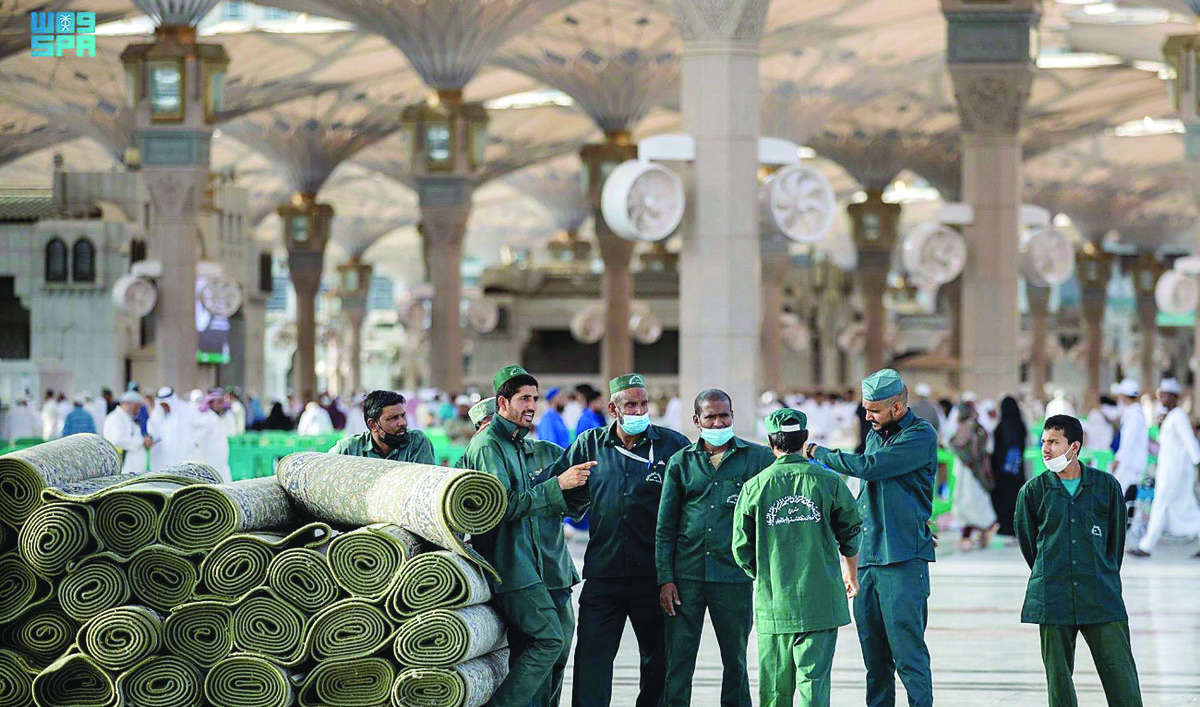JEDDAH: As part of its preparations for Ramadan, the General Presidency for the Affairs of the Two Holy Mosques covered the floors of both places of worship with 50,000 new carpets for the comfort and protection of worshippers throughout the year, especially during the month of fasting.
The carpets, which were made in Saudi Arabia, meet certain criteria and technical specifications to suit the spaces of the Two Holy Mosques and meet the needs of pilgrims and visitors.
The director of the carpet cleaning department at the Grand Mosque in Makkah, Jaber Ahmed Al-Wada’ani, said the new floor coverings took 11 months to manufacture.
They were high quality and luxurious so that worshippers could perform their prayers with “all reverence and tranquility,” he told Arab News.
The General Presidency for the Affairs of the Two Holy Mosques set up a specialist department 43 years ago to clean, disinfect, sanitize, and perfume carpets with the help of the latest and best technology.
“In the past, the carpets of the Makkah Grand Mosque used to be imported from Germany, Belgium, and Lebanon for so many years. From 1999 to 2000, carpet importing was stopped and the first batch of carpets was established in the Makkah factory,” Wada’ani said.
The first 14 batches of the Makkah carpets made in Saudi Arabia had the same technical specifications. However, they were made with a red tone. Later, green was adopted and this color became the standard hue for carpets across both mosques.
HIGHLIGHT
The carpets of the Two Holy Mosques have technical specifications that make them different from ordinary ones. They are thicker, stronger, and more durable. They have softer threads, a higher pile, feel more plush underfoot, have better color stability, and are unaffected by repeat washing.
The head of external facilities at the Grand Mosque’s Carpets Department, Muhammed Al-Thibani, described the special details and prints applied to the carpets.
“The emblem of Saudi Arabia is marked in the middle of each rug, and the remaining area of the rug is decorated with woody and floral patterns and prints of various colors in yellow, beige, and navy, all undulating in an elegant and harmonious way,” he told Arab News.
The carpets of the Two Holy Mosques have technical specifications that make them different from ordinary or ever day ones. They are thicker, stronger, and more durable. They have softer threads, a higher pile, feel more plush underfoot, have better color stability, and are unaffected by repeat washing.

Al-Wada’ani said: “These carpets are made from 100 percent pure acrylic yarn. The pile weighs 400 grams, and its height reaches 14 millimeters. The total height of one carpet is 16 millimeters.”
With their distinctive moss green tone, the carpets go through several washing operations during the year as the laundry supplies the Grand Mosque with 2,000 clean carpets a week.
There is around-the-clock monitoring of cleaning and maintenance issues, and workers in the mosque regularly sweep, sanitize, and perfume all the carpets over a 24-hour cycle.
Al-Wada’ani gave a detailed explanation of the four main carpet-cleaning stages, adding that the lifespan of a carpet was between four and six years.
“The first stage of cleaning the carpet begins with automatic dirt and dust removal using high-quality technology. Then, the second stage is washing and sanitizing the carpet automatically with disinfectants, water, and special detergents, then rinsing it with water to remove the soap.
“Then comes the third stage, where washed carpets are laid into special tubes to dry them of water. In the fourth and final stage, carpets are raised on sawmills, under sunlight and fresh air, equipped with fans to speed up the drying process. Carpets are then swept with modern special brooms, then sanitized and perfumed with the famous Taif rose water. Then they go for packaging and storage.”
Each carpet has an electronic chip and code read by radio-frequency identification linked to an electronic system with information about its manufacture date, use history, location, and washing.
















